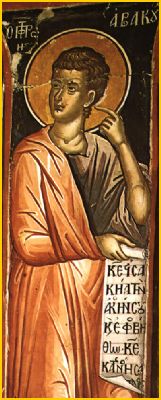|
|||
|---|---|---|---|
| This weekly bulletin insert complements the curriculum published by the Department of Christian Education of the Orthodox Church in America. This and many other Christian Education resources are available at http://dce.oca.org. | |||

The Old Testament prophet Habakkuk, in his brief book, poses deep questions about human life and suggests equally deep answers from God. The opening verses express the prophet's suffering: "O Lord, how long shall I cry for help, and Thou wilt not hear? Or cry to thee, 'Violence!' and Thou wilt not save? Why dost Thou make me see wrongs and look upon trouble?" He goes on to complain that God's unwillingness to hear means that justice is impossible to find. He asks God, "Why do You let injustice prevail?" God gives an answer that, at first glance, seems anything but merciful. He tells Habakkuk that He is doing a work "that you would not believe if told." He is using the Chaldeans, a dread and terrible people, as instruments of chastisement upon His still-beloved Israel. But God's answer does not end with the terrifying Chaldeans. He instructs the prophet to "write the vision, make it plain upon tablets...For still the vision awaits its time; it hastens to the end, it will not lie. If it seems slow, wait for it; it will surely come; it will not delay" (2: 2-3). Then God promises that the righteous will live by their faith; those who trust God will see the fulfillment of the vision, the saving plan He has for humankind. The prophet is satisfied by this promise, and at the end of his book he writes, "Though the fig tree does not blossom, nor fruit be on the vines...yet I will rejoice in the Lord, I will joy in the God of my salvation" (2: 17-18). Saint Paul quotes Habakkuk in Romans 1:17, writing about the importance of keeping faith even in suffering and worldly oppression. The fourth Ode of the Canon we sing at Pascha describes "the inspired prophet Habakkuk" who "stands with us in holy vigil" and "cries with a piercing voice: 'Today salvation has come to the world, for Christ is risen as all-powerful.'" This Ode tells us that the "vision" promised to Habakkuk has been fulfilled by Christ. Like the prophet, we can be sure that the even if the fulfillment "seems slow" we are right to "wait for it" because it does "surely come."
Saint Gregory of Nazianzus, the fourth-century Church Father, picks up on Habakkuk's declaration that he will "take my stand to watch, and station myself on the tower, and look forth to see what [God] will say to me" (2:1). In his Oration XLV Gregory writes, "Well, I have taken my stand and looked forth; and I behold a man riding on the clouds...His countenance is as the countenance of an angel, and his clothing as the brightness of piercing lightning; and he lifts his hand toward the East and cries with a loud voice...'Today is salvation come to the world.'" For Habakkuk, for Saint Paul, and for Saint Gregory, the answer to the universal question is the same: it is the Risen Christ and His salvation. |
|||
